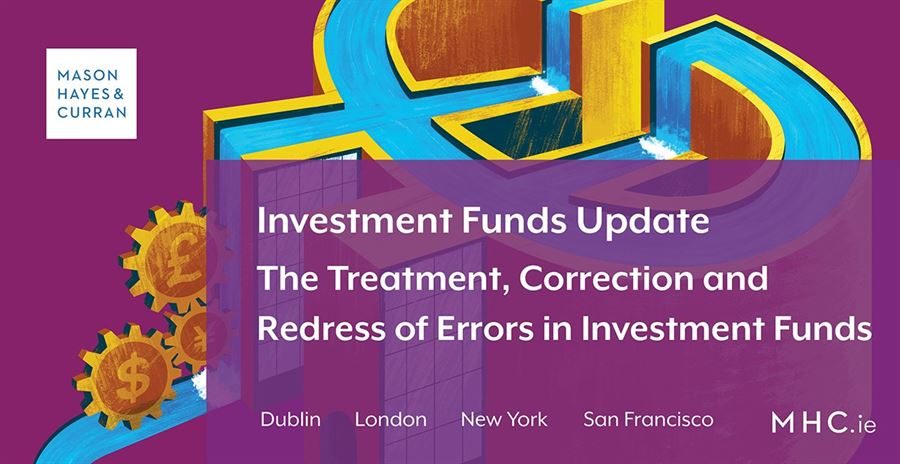
The Central Bank of Ireland (CBI) has released a consultation paper on a proposed framework (Framework) for dealing with errors in investment funds. The Framework will apply to fund management companies, including self-managed funds.
The CBI’s approach
It is proposed that the Framework will consist of the following components:
- Treatment – how errors should be treated when they arise
- Correction – how errors should be corrected, including reporting
- Redress – how the investment fund and/or investors should be restored to their original positions
Types of errors
The consultation paper envisages four types of errors which may arise for investment funds. These errors are:
- Net Asset Value (NAV) errors
- Errors relating to investments and non-compliance with the applicable investment restrictions
- Errors related to the overpayment of a fee, and
- Errors which do not fall into the categories above
Responsibility for errors
The paper provides that fund management companies will have responsibility for ensuring that errors are appropriately rectified. Depositaries will also need to ensure this is in fact the case.
Treating an error
Upon an error being identified it should be corrected without delay. Fund management companies, together with depositaries, will also have to assess the extent, or the ‘materiality’, of the error in question.
If an error exceeds a pre-determined threshold, the error should be considered material.
The proposed thresholds are as follows:
Money Market Funds (MMFs) |
0.10% of NAV |
Other investment funds |
0.50% of NAV |
Where an error is deemed not to meet or exceed the threshold, the error may still be material when any relevant surrounding circumstances are considered. These may include aspects like inadequate controls or, indeed, the duration of the error.
Regulatory reporting
The CBI currently imposes error reporting obligations on fund management companies and depositaries. The paper proposes reporting of material errors only and possibly amending the obligations that apply to fund management companies in particular.
Notification to investors
The CBI has identified that there are inconsistent approaches to the notification of errors to investors. At present, investors are generally notified when:
- The error is above the materiality threshold, and/or
- The investors are directly affected by the error and are due to be paid redress
The consultation paper proposes the introduction of an obligation whereby investors must be notified of any error found to be material, irrespective of whether redress is required or not.
Redress
Redress payments are aimed at returning investment funds or investors to the position that they would have been in had an error not arisen.
Currently, redress is not required under certain thresholds. These are €50 for retail investors and €500 for institutional investor. The paper acknowledges the merit of the thresholds as they can avoid situations where, due to the costs involved, a redress payment may not accrue any net benefit to the recipient.
The paper queries if the thresholds should apply, the rationale behind different thresholds depending on the type of investor and what the thresholds should be if they remain.
Conclusion
The CBI’s consultation paper poses a number of questions to stakeholders throughout and is open to comment and suggestions until 9 December 2019. The full text of the paper is available here.
The introduction of the Framework will provide the funds industry with clarity as to how errors should be handled and remedied. The Framework will also ensure the CBI fulfils the recommendation of the International Monetary Fund to publish rules relating to errors, as well as ensuring compliance with the IOSCO Objectives and Principles of Securities Regulation.
If you would like to know more about how enhanced error reporting obligations will impact your organisation or fund, contact a member of our Investment Funds team.
The content of this article is provided for information purposes only and does not constitute legal or other advice.





